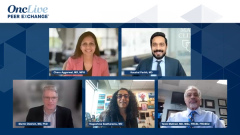
Advancement in NSCLC Precision Medicine: Biomarker Testing
Explore the latest breakthroughs in precision medicine with a focus on biomarker testing and emerging targets in patients with non–small cell lung cancer.
Episodes in this series

Transcript:
Charu Aggarwal, MD, MPH: Hello, and welcome to this OncLive Peer Exchange titled, “Precision Medicine: Biomarker Testing and Uncommon EGFR Mutations in NSCLC.” I’m Charu Aggarwal, MD, MPH. I’m an associate professor for lung cancer excellence at the University of Pennsylvania’s Abramson Cancer Center. I’m also the associate director for precision oncology innovation at Penn Medicine. I’m joined today by a panel of lung cancer experts. I would like to welcome them as they introduce themselves, and I’ll go around the room here.Dr [Kaushal] Parikh, welcome.
Kaushal Parikh, MD: Dr [Charu] Aggarwal, thank you very much for having me here. My name is Kaushal Parikh, MD. I am a thoracic oncologist and assistant professor of oncology at Mayo Clinic in Rochester, Minnesota. It’s a pleasure being here today.
Charu Aggarwal, MD, MPH: Welcome, Dr [Martin] Dietrich.
Martin Dietrich, MD, PhD: Hello, it’s good to see you. Thank you so much for having me. I’m Martin Dietrich, MD, PhD. I’m a medical oncologist at US Oncology in Orlando, Florida, and at the University of Central Florida.
Charu Aggarwal, MD, MPH: Dr Seetharamu.
Nagashree Seetharamu, MD: Hi, good morning, everyone. I’m a thoracic medical oncologist. I’m the chief of the system here at Northwell Health [in New York, New York] for thoracic oncology. I look forward to this exciting discussion.
Charu Aggarwal, MD, MPH: And finally, Dr [Tarek] Mekhail.
Tarek Mekhail, MD, MSc, FRCSI, FRCSEd: Hi. I’m Dr Mekhail. I’m the medical director of the thoracic cancer program. And the director of the AdventHealth Cancer Institute in Orlando, Florida.
Charu Aggarwal, MD, MPH: Great to have you here. Welcome, everyone, and thank you for joining us. Today, we’re going to talk about recent advances in biomarker testing and NSCLC [non–small cell lung cancer]. And then we’re going to focus on the treatment landscape of uncommon EGFR mutations. So, with that, we’ll get started on our first topic here. Lung cancer is the poster child for precision oncology. We can use targeted therapy in a meaningful and practical way for our patients with lung cancer. Dr Parikh, can you lead us in a discussion on what biomarkers we have today and why it is important for biomarker testing?
Kaushal Parikh, MD: Certainly. Biomarkers are specific signatures, molecules, or targets that give us information about disease biology, disease outcomes, as well as the predictive value of treatments. In lung cancer, we have 9 biomarkers we test for, apart from PD-L1, which is a valuable biomarker and the only biomarker we have for immunotherapies. When we look at targeted therapies, the biomarkers that we want to look for are EGFR alterations, which could be a classical EGFR mutation, or the EGFR exon 20 insertion mutations, ALK rearrangements, ROS1 fusions, KRAS mutations, MET exon 14 skipping alterations, RET fusions, NTRK fusions, HER2 mutations.
And then there are some newer and upcoming biomarkers such as NRG1, etc, which we might talk about later. The identification of these biomarkers significantly impacts the treatment outcomes of patients and significantly improves survival compared with a non–biomarker-guided treatment option for these patients.
Charu Aggarwal, MD, MPH: Do you recommend testing all your patients with PD-L1? I know you mentioned it briefly, but could you elaborate on that for us?
Kaushal Parikh, MD: Yes, I do. One, it is a much quicker test to turn around and come back. Second, in the absence of a targetable biomarker, the ones that I mentioned earlier, a PDL1-directed therapy; PD-1–PD-L1 access-directed treatment remains our first-line option. Unfortunately, we haven’t been able to improve upon the PD-L1 testing as a biomarker for immunotherapies or any checkpoint inhibitors. In my practice, I routinely test patients with a broad-panel NGS [next-generation sequencing] testing, both in solid and liquid, both in the tumor and the blood, as well as PD-L1 expression, which is a simpler immunized chemistry-based assay with a turnaround time of about 2 to 3 days at most places.
Charu Aggarwal, MD, MPH: Yeah, it’s so important. And could you talk to us about some of the emerging biomarkers that may not have targetable mutations right now but you’re interested in looking at them on the reports?
Kaushal Parikh, MD: There are several emerging biomarkers and emerging therapeutics. Currently, we are in an era of antibody-drug conjugates in lung cancers. We do have several agents targeting TROP2, for example, CEACAM5, CLDN6, HER3, which are all emerging biomarkers. Currently, we do not have a drug approved for these biomarkers, but I expect that in the next 1 to 2 years, we will have these agents in the clinic. And then also, when we talk about biomarkers and targetable biomarkers, some biomarkers inform us about the prognosis of the disease, such as STK11, KEAP1, alternative KRAS mutations like KRAS G12C, which is now a potentially targetable biomarker with clinical trials ongoing. These give us information about prognosis and outcomes, and if these patients should be treated with an escalated or more aggressive regimen, but we don’t have any agent to target these right now.
Transcript edited for clarity.





































